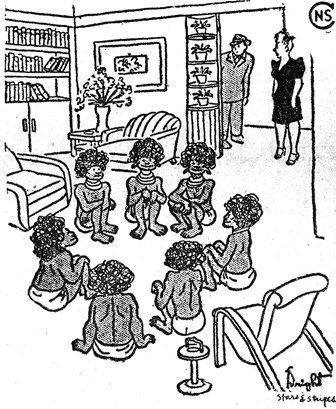
Vol. 1, No. 38 Published by India China Division, Air Transport Command October 4, 1945

Is Threat to Occupation Tommy Guns and 45s Are Used To Subdue Thugs Saigon - Armed with tommy guns and 45s, 18 ATC officers and men this week refused an opportunity to be evacuated from the scene of a political uprising where Annamese natives have killed one American and wounded another. A Reuter story reports that losses by the French, British and Annamites in last week's battle amounted to 300 known dead and 234 wounded. French authorities are said to be attempting to contact enemy leaders in order to offer a compromise about the future of Indo-China. It is estimated that 20,000 Annamites, two-thirds of them armed, are massed in the north and central Saigon area. All Volunteers The natives, who an Associated Press dispatch said were thought to have been supplied by the Japanese, attacked a convoy about 15 miles outside of Saigon on Sept. 26, wounding Capt. Joseph Coolidge. In a serious condition, Capt. Coolidge and another OSS officer, Lt. Conrad Bekker, suffering with a ruptured appendix, were flown out by ICD Sunday. The day before Annamites killed Lt. Col. Peter Dewey, son of former U.S. Rep. Charles Dewey, of Illinois. Maj. Frank H. Rhoades, commander of the Saigon ICD detachment, reported that all officers and men are remaining at their own request. As a precautionary measure everyone has been ordered to remain inside the living quarters at the Continental Palace hotel at night. Trips to the field, three miles away, are being confined to daylight hours. All men are heavily armed and are traveling in pairs as sporadic fighting continues. Lt. Col. E. K. Hastings, division I&E officer, arrived here Friday and was followed Sunday by a C-54 support mission which brought in Lt. Col. M. W. Thiessen, chief of the surgical section of the 142nd General Hospital. Bullets Whistling The plane took off from here late Sunday with Capt. Coolidge and Lt. Bekker, brought to the airfield over a route lined with enemy snipers. Traveling in three vehicles, including one truck loaded with Ghurka guards, the convoy was forced to move at a snail's pace through the danger zone. At one point where the French had set up a roadblock on a bridge, the occupants of the cars reported they could hear the bullets whistling about their ears. "The condition of our wounded and sick men forced us to slow down to three miles per hour," Col. Hastings said. "We don't know whether the Annamites were firing at us or at the French, but those couldn't have been more than inches above our heads." Earlier in the week Maj. Rhoades had attempted to obtain the body of Col. Dewey, which the natives had taken away. The Annamites agreed to deliver the colonel to him, but negotiations were interrupted by Ghurka guards shooting at the natives and Maj. Rhoades was forced to return to the airbase empty-handed. Situation 'In Hand' In addition to taking the OSS officers out of Saigon, the C-54 support mission, flown by Lt. Davis D. Shifflet, carried in badly needed penicillin, 20,000 units of insulin supplied by the U.S. Army at the request of the French Red Cross, and ammunition and supplies for American troops here. At present, Col. Hastings said, the only flights going into this base are to be made twice a week from Bangkok to bring in supplies and gasoline. The situation, he reported, is "well in hand." 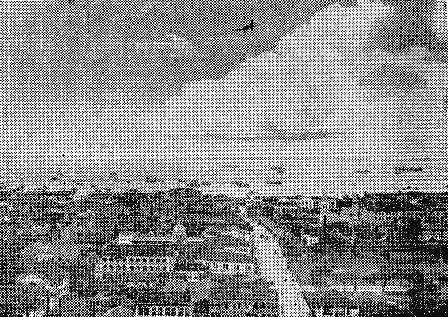 One of the first pictures of Singapore after three and a half years of Jap occupation, this harbor scene shows an ICD C-47 circling over the
battleship HMS Nelson. The plane shuttled prisoners from Sumatra and Java. (Photo by Lt. M. L. Blakemore).
One of the first pictures of Singapore after three and a half years of Jap occupation, this harbor scene shows an ICD C-47 circling over the
battleship HMS Nelson. The plane shuttled prisoners from Sumatra and Java. (Photo by Lt. M. L. Blakemore).
|
Four-Fifths of Men in ICD
To Be Sent Home by Jan.1
24-Month GIs, Officers Expected To Be
Out of Theater by End of October
Hq., Calcutta - With 4,350 ICD men already started homeward or with orders to start, repatriation was gaining momentum rapidly this week.
Sharply reduced Hump tonnage, releasing more men, has made faster repatriation possible, the A-1 section said. In addition, theater co-operation has given ICD all the shipping space it could use to date.
In October space is sufficient to take home all enlisted men eligible for separation on age or points (70) except a few radio operators; non-rated officers eligible for separation and officers and EM not eligible for separation but with more than 24 months overseas as of Oct. 1. During November and December, ICD also will have enough boat and plane space to accommodate all personnel who will become eligible for return to the States at that time, the command section announced.
Separation, Overseas Time
Quotas of similar size for November and December have been agreed upon tentatively, and if present plans work out, only approximately one-fifth of the division's peak strength will remain overseas by Jan. 1.
In accordance with an official letter of Sept. 30, every effort is being made by the A-1 section to obtain theater quotas for returning surplus personnel not eligible for separation but with long time overseas simultaneously with separation personnel. The latter, however, have a slight priority and when a man is eligible on both counts, he is sent home for separation rather than as surplus.
It also was pointed out that the new system of returning personnel with 24 months but without enough points for release provides for transfer to replacement depots on an attached-unassigned basis. This means the man is no longer in ATC, but instead will be assigned wherever the needs of the Army dictate upon his arrival in the States - to AAF, ATC, ASF or ground forces.
|
Critical Scores
If movement orders are received from theater as requested, all EM who have 80 or more points, except flight radio operators, should be on their way shortly after Oct. 15. Non-rated officers who can be spared and who are eligible for separation on the basis of Oct. 1 critical scores can expect orders shortly after that date.
Here are the latest critical point scores, as of Oct. 1:
Officers (except MD), warrant
officers and flight officers ... 75
WAC officers ....................... 39
Enlisted men ......................... 70
Enlisted women .................... 36
Effective Nov. 1, critical scores will be reduced further with EM needing only 60 points, and enlisted women, 34.
A substantial number of flying operators who have 85 points, held over because the division's commitments required their presence and no replacements were available, will get their orders pronto. A request for special consideration so that they can be sent home in the most expeditious manner possible has gone forward.
All personnel heading homeward will move by water, unless there is some outstanding reason for air shipment. This does not apply to air crews, except radio operators. Rotatees among air crewman may run as high as 1,000 in October, and it is hoped to move them mainly by air.
Bangkok ‘Evacuees’ Left in Hurry;
GIs Find Liquor Is Free
Bangkok - When the Japs "evacuated" this airfield they scrammed in such a hurry that, among other things, they left all their liquor.
In a building that combined mess hall, bar and sitting room, British and Americans found the shelves of the bar well stocked with a mixture the Japs optimistically called whisky.
Passengers who stop here on their way to Singapore have only to walk across the patio to the "cocktail lounge" and order a whisky with mix. The mix has to be paid for, but the whisky is free - to anyone who can drink it.
Former Advertiser Decides
It's Time He Tried It in Army
1343 BU, China - The local representative of the Hump Express has been besieged, of late, by a sergeant who wants to be the paper's first paying advertiser. Here's the ad he would like to run: HELP WANTED - MALE
WANTED: 1st sergeant with 40 points or less. Easy hours, good pay, comfortable lodgings furnished. Interested GIs may place applications with T/Sgt. S. L. Jones, acting 1st sergeant, Sq., B, 1343 BU, APO 430.
Seems T/Sgt. Samuel L. Jones, a former advertising representative and salesman for various products in the States, has found it pays to advertise. Now in China with 80 points and no replacement in sight, he figures it's about time he initiated a little advertising scheme in the Army.
Moslem-Hindu Riots In Bombay Result In 99 Dead, Injured
Bombay (ANS) - A full company of Indian troops stood ready Saturday for a possible emergency as the Moslem-Hindu communal riots went into the third day.
Knife play killed 19 and sent 80 to hospitals, as leaders exerted pressure to end the armed conflict. Police opened fire at two places in the northern part of the city to disperse crowds, and heavy police concentrations guarded mosques where thousands of Moslems prayed.
Girgaym mosque was fired, and residences of both Hindus and Moslems were stoned by roving groups.
Singapore Starts To Rebuild After Japs Are Kicked Out
By Maj. Miles Scull, Jr.
Singapore - This once-mighty bastion of British sea-power, this once-proud citadel of democracy which so zealously guarded white supremacy in the Far East, this once-glittering cross-roads of the world, is a ghost town today.
Guns, now spiked or empty, with which Jap Lt. Gen. Itagaki fortified the city, face a giant British battleship, the HMS Nelson, two majestic aircraft carriers and a small flotilla of other naval craft in Singapore's world-famous harbor, while thousands of British troops, poised, when Japan surrendered, to lay siege to the city, prepare to evacuate the 75,000 Japanese troops in Singapore to internment camps.
High Intrigue
Had not Japan surrendered when she did, another bloody chapter would have been written into the war's history, for there is ample evidence that Gen. Itagaki, who refused for several days to accept the Emperor's surrender order, was prepared to withstand a British siege to the bitter end.
The city - once one of the world's gayest, where English, Americans, Eurasians, French, Dutch, and peoples of all nations, met, wined, dined and carried on high intrigue in world politics, diplomacy and society, in fine clubs, hotels and restaurants and private homes - always beneath the protecting shadow of the guns of Britain's mighty warships in the harbor - is striving to come back to life.
Looted, stripped and despoiled by three-and-a-half years of Japanese occupation, Singapore has a long way to go. Her streets, her public buildings, her waterfront parks are dirty, damaged and defaced, many beyond other than makeshift repair. Her light system, her waterworks, her tram lines - all still operating in the condition the Japs left them - show the effects of neglect, ignorance and abuse.
To the people who loved Singapore's gay, cosmopolitan nightlife before the war, her plight today is pitiful, in the literal sense. Not a bar is open; not an orchestra - in a metropolis which was famous for its colorful dancing music - is playing; not a restaurant, except in the few hotels which the military have taken over, is open.
Men, women and children, some born in internment camps, owning nothing but the clothing on their backs, hungrily attack the plain food brought before them as if they had never had - which they hadn't for three years, and might never again have - enough to eat. Tiny children sit solemn-eyed and eat and eat and eat.
Yet, from these penniless, shabbily-clad, almost-starved people emanates a remarkable spirit of cheer, congeniality, laughter - a spirit the Japs could not kill.
Cheap Goods
Shops which once offered the finest, stores where shopping was an international adventure, markets to which travelers from all over the world came, are bare, or are stocked with cheap goods which the Japs didn't want when all they had to do was take what they did - except in a few very rare instances where proprietors managed to hide their stocks before the city fell.
In other parts of the city - In the business section, in the waterfront district, where the Allies blasted the docks, and in the warehouse areas - the English are working steadily at restoring the industrial life of the city, for eventual reopening of the harbor to commerce, and for resumption of normal economic contact with the remainder of the world - for the general building back of Singapore to what it once was. This will require years of work.
At Killand airport, just off the harbor almost in the heart of the city, where ICD C-54 Skymasters land on regularly-scheduled flights three times a week - evidence of the Japanese occupation is obvious, in wrecked engines, bombed hangars, and Japanese aircraft strewn about the field.
For the American GI, of which there are not more than 100 in town, Singapore is no Shanghai nor Shangri-La. The only entertainment spot in the city is a bizarre carnival center which includes a taxi-dance hall "staffed" by a mixture of Chinese, Malayan and Siamese girls who dance to a tinny makeshift band, to the tune of a one-minute swing around the floor for a Malayan Straits 25-cent piece - the equivalent of 12½ cents U.S.
'Great World'
The spot now open, "The Great World," is reported to have operated during the occupation, or at least the last six months of it. GIs who pay their Malayan dollars to dance at the cabaret do not know but what the dusky-skinned girls with whom they dance were gaily treading the light fantastic (which the entire situation is) with Japanese soldiers but a few short weeks ago.
That is Singapore today - internees - a great, gaunt, dilapidated city striving to rehabilitate itself socially, economically and politically - and a cheap nightspot - reported to have offered its comforts to the Japanese - going full blast. Not a very cheerful picture.
There is little beautiful left. But the air is clean, the sea sparkling blue beneath the sun, and the vital foundation of Singapore, the people's spirit, is alive. Someday Singapore will rise again to shine among the world's great cities.
|
Chinese Look on the Jeep With Awe and Admiration Shanghai - Not that the little jeep was ever lonely for want of attention, but it is being loved, here in Shanghai, like it was never loved before. When the citizens of this liberated city saw the first jeep they went wild with delight, crowding around the four-wheeled wonder, gaping at it, reaching out to touch it, chortling when it growled, jumping when it moved. Young and Old Even now, when its novelty should have worn off long ago, the Chinese still crowd around one when it is parked, or stop to stare at it when it putts down the street. Children are the most visibly affected. They will stand for hours and jabber, point and giggle. But they are not alone. Even the oldsters of this curious Chinese race become "curiouser." While the daytime seems to belong to the kids, the evenings seem to be taken over by the families that traipse along the sidewalk. When they come upon a jeep, they stand and eye it from a distance for quite a while, probably talking back and forth as to whether it would be safe to venture any nearer. Finally one brave soul starts up to the car and the rest follow in a single-file procession of young and old. Finally a Honk They seem to have a ritual. Starting at the front, they inspect the headlights, the grill, the hood and the bumpers. Timidly one will reach down to touch the tire, then each one in turn will follow suit until they have all felt the rubber tread. Working back towards the rear, they stop to inspect the windshield (wonder of wonders) and self-consciously stick their heads underneath the dash board to look at the wires, gadgets and gear-shift levers. At the rear of the jeepcar they fondle the spare, tap the five gallon gas can and stand in amazement as they speculate about the tail-light and reflector. Finally they reach the driver's side and timidly reach out a hand to touch the steering wheel. Some youngster that has been around knows all about the horn. In a few minutes it blares a short burst. Then one by one they file past the side of the jeep and, as they do, each one, solemnly as if he were paying obeisance to a foreign wonder, blows the horn, just once. As the last one touches the button they turn and smile and are gone into the night. |
|
SOON, MAYBE . . .
In the musty little Mexicana Bar, known to many men of the ICD who have visited this intriguing city of Shang(ri-la)hai, a major squirmed around on his bar stool and gave the comely Russian lass sitting next to him the come-on.
"What's your name, gal?" With a great smile from the bottom of her heart and with "beeg blue eyes that soke of loff," she murmured sweetly, "Tamarra."
Being already a little settled in his cups, and certainly not prepared for the reply she gave, the major weakly retorted, "Why not now? Please tell me your name, beautiful."
Once more she laughed (in Russian), "Tamarra."
In desperation the major bought her a vodka qwass (he thought it was vodka qwass; she knew it was plain old orange water at a buck a throw) and then tried again.
"Pretty please, won't you tell me your name? I promise I won't get fresh, and besides, how do you know I'll be here tomorrow?"
All she would answer was, "Tamarra."
Finally the bartender, who could stand the chit-chat no longer (even though the little glasses of orange water - of which there would probably be many more crossing the bar - netted the house about 98 cents) tapped the knight-hound on the shoulder.
"She's only trying to tell you," he said, "that her name is Tamarra. She does not mean tomorrow. She means Tamarra."
All of which confused the major more. But being a gentleman he smiled and bought her another glass of vodka qwass (orange water) as he hoped for tomorrow (Tamarra).
JEEPERS, COPS . . .
Maj. Forest Blalock, China wing provost marshal, is really a big dog now. The other day he was sworn in as a captain on the Shanghai Municipal Police force. He got a badge 'n' everything.
Nothing new for Blalock, tho'; he's already an honorary member of the police force at Casablanca and (probably) Kunming and Calcutta. So when he speaks, his voice should be filled with authority.
And as for his shoes, gosh, how they should squeak.
SIX BY . . .
The six-by-sixes have come, glory be! What a wonderful sight to behold.
Drivers in this city are notoriously lousy, drive anywhere from the middle of the road to the wrong side of the road but never on their own side. (As someone has said, it won't make any difference when they change the driving to the right side, they'll still drive in the middle.) Plus that, trucks speed down the streets, come straight at other cars, then swerve at the last minute.
GIs thought that maybe the little jeep, so proud, so evasive and so agile, would be able to stand up for itself . . but no go. These Chinese and Japanese trucks continued to lumber down the wrong side of the road and no amount of swearing, yelling or waving could make them move over. Usually the localites were too busy staring at the pint-sized wagons to pay attention to driving.
But things are different now that "big-brother" six-by-six, defender of the nation, staunch and sturdy mobile-bastion, has put its snout to the trolley lines and has growled, "Move over." And do they move!
It was a more glorious sight to see the first trucks roll by, to hear the song of the gears and all-weather tires, then it was to see and hear the Seventh Fleet steam into harbor.
WATERED STOCK . . .
Speaking of the Seventh Fleet, the Navy has put the kibash on a lot of things in this town. By way of example, a bottle of beer used to cost $21,000 CRB (about 20 cents U.S.); now it costs at least $53,000 (about 50 cents). And even to the China-based guys who have gone without beer for so long, the increase hurts.
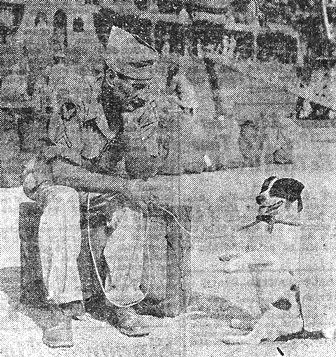 1306 BU, Karachi - While Pfc. George Swartz and his cross-breed terrier "Gip" sweated it out on the docks, the ship's captain debated letting the
dog board the General MacCrae and sail home with his master. The "teke" was finally given, and Gip walked up the gangplank, to sail for a country
he's never seen. Swartz inherited Gip, at the age of three weeks, from an RAF pilot shot down over the Hump. (Photo by S/Sgt. Norman V. Smith.)
1306 BU, Karachi - While Pfc. George Swartz and his cross-breed terrier "Gip" sweated it out on the docks, the ship's captain debated letting the
dog board the General MacCrae and sail home with his master. The "teke" was finally given, and Gip walked up the gangplank, to sail for a country
he's never seen. Swartz inherited Gip, at the age of three weeks, from an RAF pilot shot down over the Hump. (Photo by S/Sgt. Norman V. Smith.)
|
ICD Homebound GIs To Get
Good Break At Staging Centers
Hq., Calcutta - Under a new system just announced, ICD GIs and officers heading homeward get a bit of a break.
No longer will they sweat it out in overcrowded staging centers near ports. Instead, all Assam valley GIs with enough points for separation and the 24-monthers being redeployed will go to Sookerating, which halted Hump operations the first of the month.
Here, they'll get good beds, good chow and rapid processing. Port parties - 300 men with two officers - will be formed, and recreation and instruction will be provided until the call-to-port comes. Then they'll take off in planes for the port, to go aboard their ship at once.
Bengal and China wing personnel headed for home similarly will be housed and treated in a special 600-man area at Barrackpore. India men heading homeward will continue to go to Malir, which has a large enough capacity to absorb any number ICD can send.
Emperor’s Men Put On Special Details At Batavia Airbase
Batavia, Java - At the airport here where C-54s land three times a week, the Japs remain armed and there is little evidence that the war has been over for some time.
To convince himself and also the Nips, Sgt. L. G. McCurry, engineer on one of the C-54s evacuating prisoners, has special details for the Japs when he arrives.
As soon as the ship lands, Sgt. McCurry rounds up a couple of the Emperor's men - he isn't fussy about rank - and puts them to work cleaning up the ship. They sweep the floor the latrine and ready blankets and seats for those they held prisoner for so long.
"I can't understand them," says Sgt. McCurry. "After they finish a job they come to me and bow and seemingly ask for more. If everything is finished, they excuse themselves and bow out."
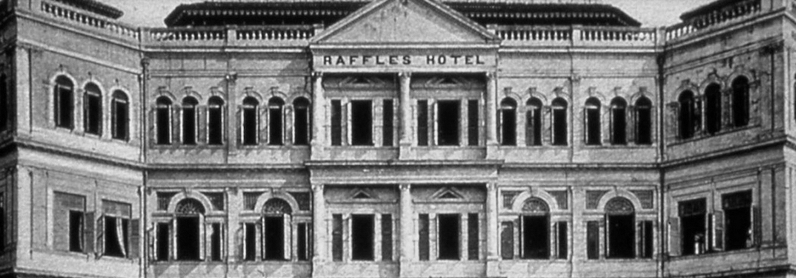
|
ATC Unit Is Quartered in Raffles Hotel In Once-Famous Old Hostelry By T/Sgt. C. A. Zeillinger Singapore - The ATC detachment here is billeted in this city's most famous establishment - the Raffles Hotel where, reputedly, Malaya's high officialdom quaffed gin slings in desperate revelry while Japanese overran the island. For the most part, it is now full of former British internees. British officers live in one wing of the hotel and the Americans in another. Few of them remember the Raffles of prewar days. One Last Fling But in one of the hotel's finest rooms lives Reginald A. C. Wills, publisher of the Straights Times, Singapore's two-page, English daily. For years before the Jap invasion he lived at the Raffles and his name was still registered on Feb. 15, 1942, when the island garrison capitulated. He was interned that same day. "The Raffles considered it a duty to keep on entertaining anyone who found time to go there," he recalled. "There was a band and plenty of good liquor. Men who strayed from disorganized units went to the Singapore volunteer station which was on the waterfront just across the street from the hotel. While waiting for orders to join new units it was only natural that they should cross the street and spend their time waiting in the still-gay atmosphere of the Raffles. The British expected to be shot and as long as there was a chance for a last fling at life they would have it." Japs Moved In In the last hours of the ten-day siege, Wills and most of the other able-bodied residents of the hotel set up batteries along the beach upon which the hotel fronts. As the Japs approached the rear of the hotel, the batteries fought with their backs to the sea, pouring artillery fire over the hotel into the enemy lines. Walls, balustrades and patios are splintered where bullets, intended for occupants of the hotel, finally lodged. After a 36-hour struggle the small battery capitulated. The Japs moved into the Raffles. Under the shame of having to cater to unwanted guests, most of the employees quit. After years of ministering to a select clientele they couldn't stand being bossed around by the strutting Jap military. Municipal Gin The Raffles lost more than its staff during the occupation. All the food and liquor and kitchen facilities were disposed of by the Japs. Furniture, rugs and fixtures went to ruin. The Raffles, known throughout the world and mildly praised by Kipling, became a mere shell. Although the Japs have been gone for almost a month now, there is no hilarity. The former internees aren't inclined that way. Nor is there much for the others to do. The best drink is "municipal gin" and in Singapore, municipal gin and water are synonymous. So, while the British soldiers aren't much impressed and the internees are busy with their affairs, the GIs cuss the plumbing, the municipal gin and the fish they eat three times a day - thinking little of the once-great Raffles hotel. |
OSS Doctor Saves Lives
Of Many Chinese Friends
By 'Backwoods' Operations
By Rus Walton
Kian, China - Here, in this small town famous for its porcelain and pottery, has been born a saga of military medicine. Here, in this place where the almost-green water of the Kan River still carries debris and rubble in its course, a man like famous Dr. Seagrave of Burma has risen, not to fame or fortune, but to the occasion.
There are many Chinese soldiers and civilians alive today because of the work of this young U.S. Medical Corps doctor, who for the present shall be known as "Mac." (His real name must be withheld.) Until he was relieved at the cessation of hostilities, Mac was attached to an OSS group, working behind Japanese lines in eastern China. For many months he and his companions lived and worked with the Chinese troops of the 37th Army, doing liaison work for the U.S. forces in the theater.
Near Death
Although supplies were meager and often there was not enough medical equipment to stock a small first-aid station, to say that Mac was unprepared would be wrong. A man like Mac, with his love for man and his tender, yet thorough knowledge of ills never will be unprepared.
So it was that day after day, night after night, in the midst of battle, in the quiet dampness of lonely mountain caves, in the shattered ruins of bombed-out buildings and in the back of jouncing trucks, he performed miracles closely akin to the wonders performed in the most modern operating rooms.
Take the time a Chinese girl came to his station, a shack in the middle of the battle area, with six wounds - all caused by one bullet from a Jap sniper. She was a secret service worker who had been shot while trying to escape from a Jap camp. She was near death from internal hemorrhages and loss of blood.
Brave Chinese
With poor equipment, without proper sterilization and with no plasma or adequate transfusion material, Mac went to work, dressed the wounds, grabbed a Chinese standing nearby and gave the girl a hasty transfusion. He did not have the equipment nor the time to test for blood types. The girl recovered. Today she smiles at the sound of the name of the American doctor who saved her life.
Mac never talks about himself, rather he likes to tell about the bravery of the Chinese, his wonderful patients. Time and again he has had to perform amputations and serious operations without anesthesia. On some occasions a pen knife has been the only available instrument. But the Chinese never whimpered.
Maggots Busy
Long after the battle of Kian, when the Japanese were driven back and the tide was turned by Gen. (the "Tiger") Yu Shieh Yoh's ragged, rugged 37th Chinese Army, the patients kept coming in. Some of them had fallen during the battles in the hills and had suffered where they fell until companions brought them to the doctor. Often their wounds were infected with gangrene, covered with maggots and stinking like only a living dead man can stink. For these men the treatment was simple - the wounds were cleansed a bit and then bandaged, the maggots had done the rest.
Not all the doc's work was in the field of medicine. When the P-51s of the CACW (Chinese-American Composite Wing, 14th AAF) came over to help the ground troops by dive-bombing and strafing the Japs, Mac directed the planes by means of a walkie-talkie which had been dropped. The air-ground co-operation was credited as being the deciding factor in the battle for Kian. In order to take the town, the Japs had to cross the Kan River first. Every time they tried to cross the river Mac would call the fighters from their hiding places in the sun.
There has been no monument erected to this man of medicine, no medal cast for this soldier of the AUS. The people of Kian are too hard-hit by the misery and destruction of war to be able to afford any marble and brass. But forever in the hearts and the minds of those who are alive because of his work, will be the eternal monument of loving memories. The light that shines from the eyes of these people in that small Chinese town glitters far more than the shine of any medal that was ever cast.
Regular Flights to Shanghai, Singapore Inaugurated by ATC
Hq., Calcutta - With the end of the war and consequently the opening of all airports for ATC's use, newly-scheduled air routes have made an anachronism of the phrase, "the far corners of the earth."
Development of new routes has followed the need for regular means of transportation for American forces deployed throughout the world.
As part of this stepped-up air travel service, ICD has inaugurated scheduled flights to Singapore and Shanghai with stops along the route.
The Singapore run leaves Calcutta three times a week, leaving from Calcutta on Mondays, Wednesdays and Fridays and the return trip is flown on Wednesdays, Fridays and Sundays.
The Shanghai flight has been started on a schedule of every other day. Stops are made at Kunming and Peishiyi, the principal airport serving Chungking.
Lalhat Gets CG's Praise For Its Safety Record
1326 BU, Lalmanir Hat, India - For a flawless flying safety record during August this base received a commendation from Gen. Tunner. The 1326th is one of the four ATC installations in India that have been selected to remain in operation for an indefinite period.
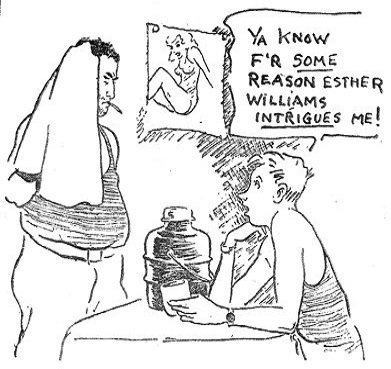
|

Veterans United for Peace
With the second war in one generation finally brought to a close, the thoughts of veterans of this war are turning to the problems of peace - a long and lasting peace.
We have seen the foundations of a new world order laid at San Francisco, but knowing of the greed, the fear and distrust between nations and having read the history of over 2,000 years of bungling by world politicians we are not convinced that the new order will be the answer to recurring wars, even though we hope and pray it will succeed.
While we have seen, firsthand, the power of armed might, and know of the power of the atomic bomb, we do not believe that these alone are the answer.
Our fathers fought the last war to make "the world safe for democracy" and "to end all wars." We fought this one for no slogan. It was just a job to be done. We expected nothing except victory. Yet, cynics that we are, we do not believe that future wars are inevitable.
There is only one way to be sure that our time in the Army has not been wasted and that the men who died have not, like the men who died in past wars, died in vain. That way is for us, the veterans of this war, of all nations, to work together for peace just as we have been working together for war.
Already World War II veterans' organizations are springing up right and left and others probably will come into existence as soon as more veterans are released.
There will be many motives claimed for their existence. Some may demand special benefits for veterans; some may want only to get the veterans together for a good time.
To have an effect on the peace of the world there must be at least one large, strong veterans' organization. It must not be organized for selfish reasons, demanding benefits only for itself. Nor can it accomplish its mission of a long peace if it champions dozens of causes or tries to make this a utopian world.
The big duty of this veterans' organization would be to keep its eye on the governments of the world, on the leaders and the molders of public opinion. When any of these - or when any other group - would do anything that might endanger the peace, the veterans would turn the withering rays of publicity upon their actions. Or when any of these, through neglect, failed to actively promote the interests of peace, the veterans would prod them into action.
Such an organization will resemble the atomic bomb - it can accomplish a great good, or it can be a great danger. In keeping a watchful eye on all the world - fighting that which might endanger peace - it must not forget to keep a double watch on itself, refusing to compromise its ideals, slacken its efforts or to settle for "peace in our time."
Such an organization is possible. Its opportunities for serving mankind are unlimited. It will be our job, as returning veterans, to decide which of the many organizations now being organized is best fitted for the work before it. Or if all, being weighed, are found wanting, a new world legion of veterans must be organized.
If, on the day we lay aside our uniforms for good, we also lay aside our responsibilities towards the peace, then we shall know we have left our job incomplete, that those who bungled from 1918 to 1939 probably will bungle again and another war will be in the making.
As it is, the men who fought in this war will go down in history just as did the men who have fought in countless wars before us. As men who, in spite of the fear, greed and hate in the world, KEEP the peace which we have won, history will honor us as none have been honored before.

|
Furlough Now
Editor: It is suggested in connection with the drive to obtain one-year volunteers for the ICD that if a provision were made to let such volunteers go Stateside immediately for a furlough, while there are enough people here awaiting water transportation to man the operation, there would be sufficient officers and men sign up for this additional time in the Orient, making any drafting unnecessary.
*Soldiers name withheld, 1351 BU, Kurmitola




'Listen to Our Plea'
Editor: We believe we have a legitimate gripe and we ask you to listen to our plea. We have situated at Replacement Depot No. 1, after having come from China and the Valley, waiting for the final "go-sign" to depart from Karachi.
While waiting we have seen the fellows who have fought the rough war of Karachi, but we don't mind that because that's just the breaks of this man's Army. However we do mind when these Karachi Commandos come to the depot in vehicles, go through all the processing in a couple hours and arrive in the alert area all in the same day, while we have to trudge across this damn hot desert and take three days to complete our processing.
Even that isn't too bad, but what we are really sore about is that these Karachi airbase boys remain in the alert area about two and a half days and then are called to depart from the airbase. There have been GIs in this alert area for five to eight days. Yet these Karachi Commandos can go in a total of three days flat. We ask you, is this fair?
S/Sgt. Yale A. Bernstein*, formerly of 1342 BU, China
*Also signed by nine other GIs.




'When Do We Leave?'
Editor: This is the first gripe letter I've ever written. According to ICD letter 220.8, posted on our bulletin board, men eligible for separation under the point system would be released immediately if they could be spared without replacement.
My MOS is 2756 (radio operator), but since I am not flying (I'm working in the capacity of a 590) personnel here wrote that I could be spared without replacement. I had 85 points as of May 12.
We see men from every organization on the field leaving for home with 80 points. I have read many circulars as to the attempt of ICD to improve morale.
What I want to know is just when the hell am I going home?
Pfc. Frederick D. Newman, 1343 BU, Luliang, China
Ed.- A wingram has just gone out to all ICD bases, advising that radio operators with 85 or more points as of V-E Day now may be released. A shortage of R/Os prevented release of all except highest point men until now. You can expect the good news soon.




Best Informed Soldiers
Editor: One of our greatest sources of pride during the war was the knowledge that we were always kept informed of what was going on. We were always the best informed soldiers in the world. Would it not also be fitting if we were also the best informed in this period of readjustment?
Here in China, we have been watching thousands of men going home. It's wonderful to see the men of SOS, CCC and other air corps units leaving. But it doesn't help the morale of ATC personnel. We see men over 35, men with sufficient points, and men with 24 or more months overseas leaving daily. We're glad that someone is going home. But, in our outfit, we must listen to the gripes from the men supposedly eligible for return. Our commanding officer holds regular gripe sessions. But unfortunately, his answer to all the queries is, "I don't know."
|
Is it unfair to ask: Why can't we be told when we can expect to go home? Is it unfair for us to ask our division headquarters to let us know when men over 35, men with sufficient points under War Department directives, men with 24 or more months overseas can expect to leave. Is it unfair for us to desire to be the best informed soldiers in the world?
From men who would like to be kept informed, 1340 BU, Kunming
Ed. - The story on page 1 may help to answer some of your questions.




Cracks at a WAC
Editor: Here's one for the WAC who did so much to win the war.
I'm a lowly sort of a man - a draftee - but I can make a suggestion to that must-be-lovely female:
Before she yells to go home again, let her look over the pin-ups in the Hump Express and even in the Roundup.
There's competition back in the States. Best she apply for Shanghai!
Dale Trabue, 1306 BU, Karachi
Editor: We will now arise and sing the first verse of the "Star Spangled Banner" for the disgruntled WAC who "volunteered to help win the war" and is now stuck overseas with a lot of draftees.
A lot of POWs who pass through Karachi were draftees. A lot of the men who were killed were draftees. And the Japs and Germans will testify that they were men - as you doubt . . .
If it is any consolation to you, this writer never saw combat either - and the serial number starts with a "1" . . . Those draftees (AND we enlistees) want to get home, too, Sister, but we probably won't until we haul you back first - so stick it out.
Cpl. Hal Walker, 1306 BU, Karachi




And a Smack for a WAC
Editor: I have heard all kinds of criticism around here about the WAC who wrote the letter in last week's Hump Express. What th' hell, can't a WAC gripe? (Griping is supposed to be a sign of being a good soldier.)
While I don't like her remark about draftees (being one myself) I know that I, and 90 percent of the fellows I've heard condemning her letter, have made worse remarks about WACs. Furthermore, there isn't a GI who has been one month in India who doesn't want to go home - but fast. Why shouldn't a WAC want to go home? Personally I think she is a lot brighter than the 97 percent of girls who signed up to stay another year.
*Soldiers name withheld, 1300 BU, Calcutta
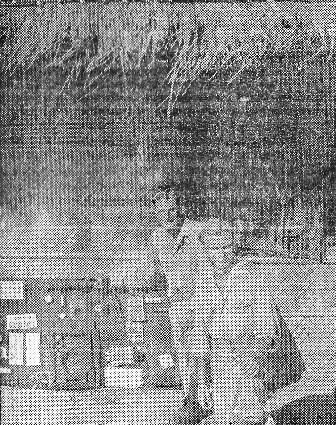 Two GIs on leave pose with a sample jungle kit, lifesaver to many a bailout.
Two GIs on leave pose with a sample jungle kit, lifesaver to many a bailout.
|
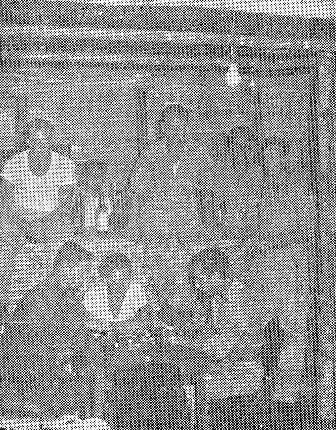 At the camp's EM club plentiful jungle rations are a big morale-booster
At the camp's EM club plentiful jungle rations are a big morale-booster
|
At Isolated Rest Center
1351 BU, Kurmitola, India - Living conditions reminiscent of a Stateside resort, plenty of stimulating activity and a chance to just loaf and relax are the features of Camp George George, former jungle indoctrination camp now being used as a rest camp for GIs.
Hemmed in on three sides by an almost impenetrable jungle and on the other by the crashing waves of the Bay of Bengal, George George is located on the eastern side of the bay, some ten miles from Burma, and several miles away from any airbase or native village.
The jungle indoctrination course has been abandoned, and the men on leave now spend their time fishing, hunting, swimming or "hitting the sack." A steady, water-fanned breeze makes the days and nights comfortable despite the torrid Burma heat.
The changing tides of the Bay of Bengal add to the air of "roughing it" at the lonely and picturesque camp. Inaccessible as it is, George George must rely on air transportation alone for supplies, and the landing strip is the beach.
When the tide is in, the men are momentarily marooned. When it is out, the water becomes dangerous because barracuda are washed in close to the shore line. No swimming is allowed during low tide.
Since Maj. James N. Kempner, Little Rock, Ark., took over as CO this spring, living conditions at the camp, say the restees, might well compare to a resort in Uncle Sugar.
Hospital beds with real mattresses, well-made bashas, sanitary conditions, well-cooked food, good sports facilities and hunting expeditions into jungles which once tested a crewman's jungle-learning highlight the men's stay at George George.
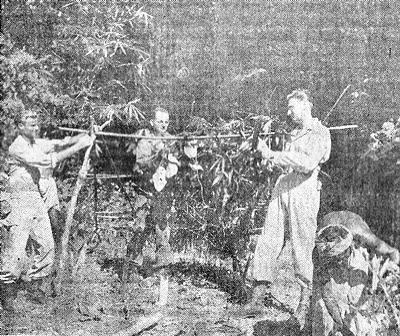 In a clearing in the jungle by the camp, Pfc. Edward P. Lotko, Long Island, N.Y.; Pfc. Lory Goldstein, San Francisco, Calif., and Sgt. Chick Askenas,
Long Island, show how they used to teach aircrew members to build lean-tos.
In a clearing in the jungle by the camp, Pfc. Edward P. Lotko, Long Island, N.Y.; Pfc. Lory Goldstein, San Francisco, Calif., and Sgt. Chick Askenas,
Long Island, show how they used to teach aircrew members to build lean-tos.
|
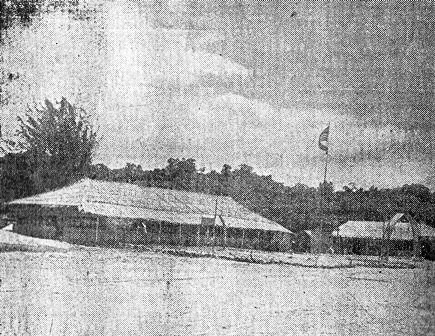 A partial view of George George, isolated from airbases and Indian villages alike by jungles and the Bay of Bengal. Men on leave find this camp
a good place to spend "time off" while awaiting transportation home.
A partial view of George George, isolated from airbases and Indian villages alike by jungles and the Bay of Bengal. Men on leave find this camp
a good place to spend "time off" while awaiting transportation home.
|
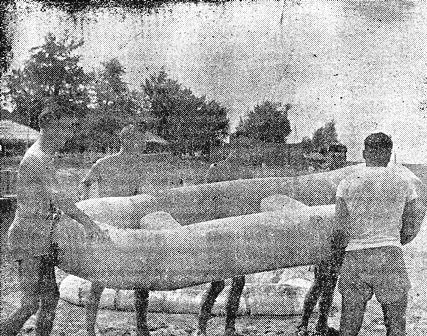 One of the favorite sports at George George is riding the waves of the Bay of Bengal. Here, five restees take out one of the rubber life-rafts
to do battle with the currents.
One of the favorite sports at George George is riding the waves of the Bay of Bengal. Here, five restees take out one of the rubber life-rafts
to do battle with the currents.
|
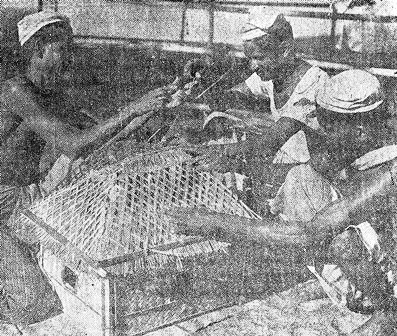 Three enterprising Indians from Kurmitola have started a miniature basha business, and have found ready buyers in Bengal wing GIs. No one yet
has figured out a way of getting the souvenirs home, however.
Three enterprising Indians from Kurmitola have started a miniature basha business, and have found ready buyers in Bengal wing GIs. No one yet
has figured out a way of getting the souvenirs home, however.
|
Jorhat Shuts Down After 16,903 Hump Trips; 73,433 Tons
1330 BU, Jorhat, Assam - Old 589, a C-87 with 3,200 hours, made the final flight over the Hump from here this week as 1330 closed shop after two and a half years of operation.
From the time this base was activated on Apr. 15, 1943, until its final day of operation, 16,903 trips to China were made. Cargo lifted over the Hump totaled 73,433 tons. Other achievements include the December, 1943, record month when 28.8 trips per assigned aircraft were recorded. The biggest single day's operation took place last Aug. 1 on Air Force Day when 99 round trips took cargo to China.
On the final flight in number 589 a veteran first pilot, Capt. Robert J. McClurg, completed his 62nd trip and 600th hour over the Hump. His cryptic comment was, "Very unusual flight. Nothing happened."
 If Uncle Sam could only go along with a gag, some GI in the ICD might get this little package of oomph at mail call. But even if you can't play
post office with her we don't think pert and pretty Olga San Juan would mind of you did your Christmas ogling early.
If Uncle Sam could only go along with a gag, some GI in the ICD might get this little package of oomph at mail call. But even if you can't play
post office with her we don't think pert and pretty Olga San Juan would mind of you did your Christmas ogling early.
|
ATC Globe-Girdling Craft Flies Correspondents On Tour
1304 BU, Barrackpore - ATC's inaugural around-the-world flight - the first in history which circles the globe in 151 scheduled flying hours - arrived here, on the outskirts of Calcutta, at 8:15 p.m. Monday, exactly on the ETA. It departed for Kunming one hour later.
Known as the "Globester" for the world flight and as the "Marco Polo" for the portion of the route covered by the ICD from Karachi to Manila, the big, luxuriously-appointed C-54 Skymaster brought eight through-passengers into Calcutta. They departed Washington Sept. 28 and will return Oct. 4.
McKissack Pilot
Three American correspondents making the trip are Inez Robb, of International News Service; Paul Miller, of Associated Press, and Frederick C. Othman, of United Press. Accompanying them are Col. C. B. Allen, ATC operations; Col. M. S. White, ATC flight surgeon; Maj. James W. Speer, ATC P&T; Capt. Phillip R. Warth, ATC PRO, and Q. K. Porter, AAF photographer, all of Washington. Col. White is conducting medical research on fatigue, effects of constant air travel over a period of days, and changes of climate around the earth.
ICD crew members who flew the plane from Karachi to Calcutta were Maj. T. L. McKissack, pilot; Capt. R. A. Brogan, co-pilot; T/Sgt. Gene Montecchie, engineer; P. Norman Withorow, radio operator, and S/Sgt. T. M. Eckstein, flight clerk. Continuing the flight to Manila were Capt. Richard H. Drake, pilot; F/O Leroy P. Lyons, co-pilot; Capt. Albert P. Brown, navigator; Pfc. Jack D. Seratt, engineer; S/Sgt. Byron L. Scott, radio operator, and Pfc. Norman Van Valkenberg, flight clerk.
Lush Comfort
The "Globester" was on schedule on every leg of the flight. From New York to Calcutta took 63 flying hours with brief stops at the Azores, Casablanca, Cairo and Karachi. Stops eastbound from Calcutta are Kunming, Manila, Honolulu and San Francisco into Washington.
The round-the-world passengers on the giant four-engine airliner showed no signs of fatigue on debarking at Calcutta. The aircraft has deep, cushioned reclining chairs, a kitchenette which provides hot meals en route, and modern restroom facilities in the cabin.
|
China’s Communists, Chiang Govt. To Meet
Chungking (ANS) - Agreement of Generalissimo Chiang Kai-shek's central government and the Chinese communists to convene at an all-party political council early this month gives promise of paving the way for settlement of the bitter internal conflict which has torn China for the past decade, United Press reported. Under the present plans, the political council will have the power to make binding decisions, and has scheduled two broad subjects: the policy of peaceful reconstruction for China, and establishment of a national assembly which will attempt to frame a new Chinese constitution. |
Karachi Base Every Day
1306 BU, Karachi - Each day an average of 50 ex-prisoners of war leave this base for the States and their homes. Since they started arriving less than a month ago over 600 POWs have passed through here.
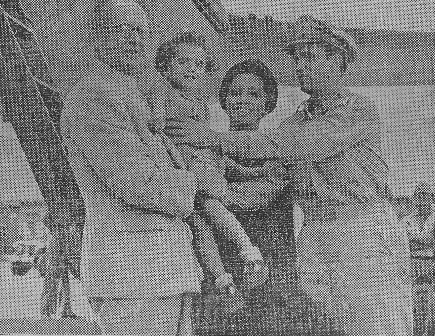 While a grinning Jap soldier (right background) looks on, Glenda Newport, 3½, tiny American internee from Java, is lifted into her father's
arms by Capt. E. C. "Mickey" McGuire, chief pilot of ICD mercy flights to Batavia. Mr. and Mrs. Newport and Glenda were evacuated to the States from
their three-and-a-half year internment.
While a grinning Jap soldier (right background) looks on, Glenda Newport, 3½, tiny American internee from Java, is lifted into her father's
arms by Capt. E. C. "Mickey" McGuire, chief pilot of ICD mercy flights to Batavia. Mr. and Mrs. Newport and Glenda were evacuated to the States from
their three-and-a-half year internment.
|
Father, Mother and
Baby United Again
After Internment
Batavia, Java - Reunited here after three and a half years of separation, hardship and anxiety, Mr. and Mrs. J. R. Newport and their daughter, Glenda, 3½, started on their happy way toward the States aboard an ICD plane this week.
Glenda, born ten days before Java fell to the Japs in late February, 1942, and her mother were in a Nip internment camp near Bandoeng, while Newport was in a camp some distance away. He knew nothing of what had become of his wife and daughter until they were evacuated and reunited.
Newport, in the tin business before the war, was married in Java. When the threat of Japanese invasion came, he moved his wife and infant daughter from their home in Groet, Java, 150 miles back in the hills, in a futile attempt to escape the invaders. He finally was forced to give up his family.
Aided by influential Batavia friends, the family was refreshed by two weeks of good food and rest.
HUMP EXPRESS is the official newspaper of the India-China Division, Air Transport Command, APO 192, c/o Postmaster, New York, N.Y., and is published by its Public Relations office. Camp Newspaper Service and Army Newspaper Service features are used, reproduction of which is prohibited without permission of CNS and ANS, 205 East 42nd St., New York, 17, N.Y. Other material is submitted by staff members, ICD-ATC base Public Relations sections and other soldier correspondents. Printed weekly by the Hindusthan Standard, 3 Burman St., Calcutta, India, and distributed each Thursday. Passed by U.S. Press Censor for mailing.
| Military transport schedules over India for cargo, personnel and mail ... maximum tonnage of essential war materials over the Hump ... movement of troops and supplies in support of tactical operations in China ... evacuation of the sick and wounded - these are the missions of ICD-ATC. |

OCTOBER 4, 1945
Photo of Raffles Hotel has been added to this re-creation
Original issue of HUMP EXPRESS shared by Barbara Skinner Lipiew
Copyright © 2018 Carl Warren Weidenburner
TOP OF PAGE PRINT THIS PAGE ABOUT THIS PAGE E-MAIL YOUR COMMENTS
PREVIOUS ISSUE HUMP EXPRESS BASE NEXT ISSUE
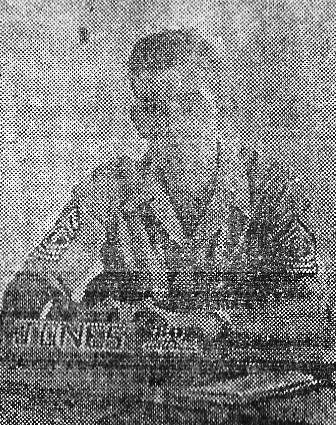 1343 BU, China - 1st Sgt. Samuel L. Jones, with his 80 points, would like to hand over his job to some 40-point replacement.
Over-exuberant about the easy hours, good pay, etc., Sam wanted to be "shot" with his feet propped on the desk.
In spite of the conventional pose, the job still looks easy - any suc - - - - oops, any takers?
1343 BU, China - 1st Sgt. Samuel L. Jones, with his 80 points, would like to hand over his job to some 40-point replacement.
Over-exuberant about the easy hours, good pay, etc., Sam wanted to be "shot" with his feet propped on the desk.
In spite of the conventional pose, the job still looks easy - any suc - - - - oops, any takers?
